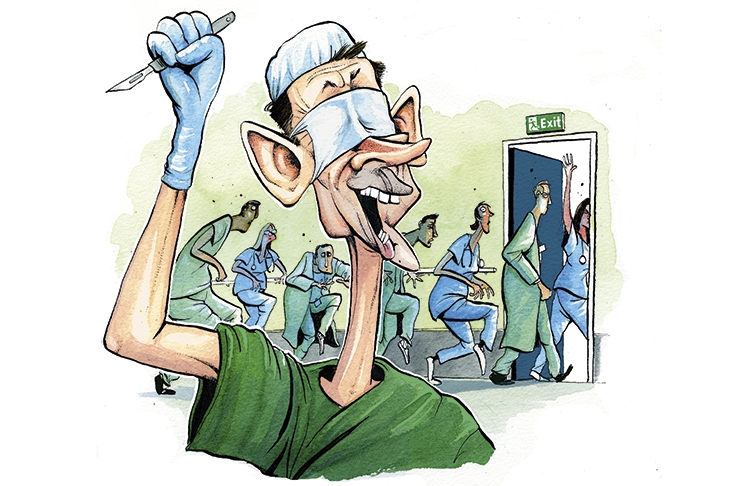The benefits of indecision
Sir: Belgium has often been without a government for months on end without suffering any economic collapse. In Britain in recent decades governments with large majorities and led by ideologically driven prime ministers have made disastrous decisions on welfare reform, foreign policy and selling off social housing. Isabel Hardman is correct to say that ‘decisions are needed to solve problems that have festered for years’ (‘The in-tray of horrors’, 8 June). However her analysis should also consider the benefits of government paralysis: the damage that has been avoided because superficial and ill-thought-out policies never saw the light of day.
Ivor Morgan
Lincoln
A doctor writes
Sir: In his interview with Katy Balls (‘Operation Hunt’, 8 June), Jeremy Hunt claimed he had faced down the junior doctors in a strike which ‘lasted almost as long as the miners’ strike’. That is untrue. The miners’ strike lasted 363 days. The junior doctors’ four strikes lasted for 24-48 hours each and only the last one included withdrawal of emergency care.
In fact, the doctors’ strike was based on Hunt’s false premise that junior-doctor rostering was responsible for 11,000 unnecessary weekend deaths — an allegation subsequently proven to be untrue. That damaging allegation alienated a generation of junior doctors.
This is proved by the fact that in 2012 when Hunt was appointed Secretary of State for Health, 67 per cent of junior doctors completing compulsory foundation training progressed to speciality training. By 2018, that figure had fallen to 38 per cent. Is this one good reason why Mr Hunt should not be our next prime minister?
Meirion Thomas
London SW3
Emotional rescue
Sir: Cressida Connolly’s article on dementia is brave in many ways, and the issues it raises will chime with many (‘The upsides of dementia’, 1 June).There is no sugar-coating dementia as it advances. However, for people with the disease, evidence shows the benefits that time with loved ones brings even when they mightn’t seem to know who those loved ones are. The amygdala in the brain, which controls emotions, is less affected by dementia, and creates contented feelings during and after visits, even when the person might not remember why. While everyone has the right to describe their own experience in their own words, it’s important to recognise that there are many different stages and experiences of dementia, and speaking in generalisations can reinforce the stigma about the disease. I had rather hoped that we’d moved on from the demeaning language of ‘sufferer’, ‘demented’ and ‘lost their marbles’.
Jeremy Hughes
Chief Executive, Alzheimer’s Society
Tax-paying contest
Sir: Rory Sutherland ponders how to make paying tax feel worthy (The Wiki Man, 8 June). As he suggests, it is unlikely we will achieve this through moral obligation alone. Perhaps the answer is to make it a competition by publishing tax returns. It is not often that one finds one of John McDonnell’s suggestions compelling, but while his motivation is to shame, would such a move not instead pander to the fashion for competitive virtue-signalling? If we harness that phenomenon to ‘nudge’ those lucky enough to have taken the spoils, there has to be a chance they would willingly play their part in providing for the remainder. Never mind cutting the top rate of tax, Boris; adopt this as house policy and let the tax receipts roll in.
John Smith
Chesham Bois, Bucks
Cool for cats
Sir: Mary Wakefield omits the greater hypocrisy of vegan cat owners (‘Vegans should go cat-free’, 1 June). ‘Whatever you feed them, however much your neighbours feed them’, they will kill, she says. But what are they being fed? The least humane, most intensively farmed meat our society has to offer, that’s what. When my semi-feral cat drags in some rodent, amphibian or bird that, moments before, was living freely on God’s green earth, I chalk that up as a victory for imprisoned rabbits, pigs and chickens everywhere.
Ross Butler
Bookham Commons, Surrey
It’s not about us
Sir: Your editorial in praise of a free-trade deal with the US (‘Playing chicken’, 8 June) misses the point when it comes to chlorinated chicken. The argument against allowing it is not that such chicken is dangerous to eat. It is that the need for chlorination is a sign of unhygienic animal husbandry. It is an animal welfare issue, not a human health one.
Tim Cheatle
London E3
Wrong Foot
Sir: It was amusing to read Rod Liddle (‘How to save the Tory party’, 8 June)
quote Michael Foot saying that ‘you can rat, but you can’t re-rat’ — and then be reminded, in a letter a few pages later, that Winston Churchill defected to the Liberal party and then rejoined the Conservatives. Foot, bless him, seemed to get everything wrong. Maybe the key thing is who does the ratting.
Gregory Shenkman
London W8
A fine farewell
Sir: This afternoon I had the pleasure of reading some beautiful writing by Charles Moore regarding his father (The Spectator’s Notes, 8 June). The article was respectful, balanced, sensitive and kind. So much so, I decided to read the article aloud to my wife. The final paragraph reduced her to tears.
Peter Phillips
Herefordshire






Comments